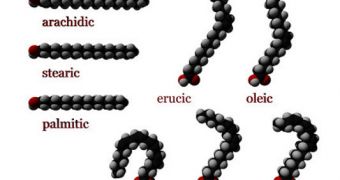As we eat, an important part of our modern-day diets unfortunately consists of fatty acids. These chemicals are absorbed into the body, and then go on to be metabolized, and a new research shows precisely how this happens. According to the research team, which is based at the Swedish medical university Karolinska Institutet, blood vessels and the muscles of the heart play an instrumental role in controlling the uptake and distribution of fatty acids throughout the human body. We ingest these particular acids when we eat meat, milk products and other foods.
The study is extremely important because it addresses directly the series of factors that eventually trigger the formation of type II diabetes, and also of cardiovascular diseases. As more and more fatty acids settle in muscles (pathological accumulations), the risk goes up higher and higher. Knowing that the heart muscles and the circulatory system control the uptake could lead researchers to developing new therapies that would restrict the excessive accumulation of fat in the muscles, thus preventing these two very dangerous conditions. Type II diabetes is known to be a risk for people who already suffer from obesity, the researchers add.
The target of the Swedish investigators for this study was the biological function of the VEGF-B protein, which they thought may be playing a very important part in fatty acid uptake. It was discovered following study that a direct correlation existed between the VEGF-B levels and the energy status of the muscles, as well as the content of mitochondria, the organelles most commonly referred to as the “power plants of the cell.” They produce ATP, a compound without which cells would receive no energy and would be unable to perform even the most basic processes.
“Mice that lacked either the VEGF-B protein or its receptors in the walls of the blood vessels had a lower intake of fat to the muscles and the heart, and less accumulation of fat in the different tissues. Instead, we found that the residual fat accumulated in the white adipose tissue, causing a slight weight increase in the mice,” says KI Department of Medical Biochemistry and Biophysics associate professor, Ulf Eriksson. He is also the lead author of the new study, which appeared in the latest issue of the respected scientific journal Nature.

 14 DAY TRIAL //
14 DAY TRIAL //